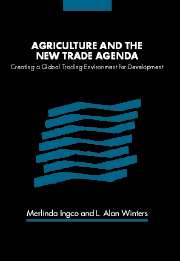Book contents
- Frontmatter
- Contents
- List of figures, tables, and boxes
- List of contributors
- Preface
- List of abbreviations
- 1 Introduction
- 2 Agriculture and the trade negotiations: a synopsis
- Part I Experience and lessons from the implementation of WTO agreements
- Part II Interests, options, and objectives in a new trade round
- Part III New trade rules and quantitative assessments of future liberalization options
- 8 Market access, export subsidies, and domestic support: developing new rules
- 9 Options for enhancing market access in a new round
- 10 Liberalizing tariff-rate quotas: quantifying the effects of enhancing market access
- 11 The global and regional effects of liberalizing agriculture and other trade in the new round
- 12 Modeling the effects on agriculture of protection in developing countries
- 13 Liberalizing sugar: the taste test of the WTO
- 14 Bananas: a policy overripe for change
- Part IV New trade issues and developing country agriculture
- Author index
- Subject index
- References
14 - Bananas: a policy overripe for change
Published online by Cambridge University Press: 27 February 2010
- Frontmatter
- Contents
- List of figures, tables, and boxes
- List of contributors
- Preface
- List of abbreviations
- 1 Introduction
- 2 Agriculture and the trade negotiations: a synopsis
- Part I Experience and lessons from the implementation of WTO agreements
- Part II Interests, options, and objectives in a new trade round
- Part III New trade rules and quantitative assessments of future liberalization options
- 8 Market access, export subsidies, and domestic support: developing new rules
- 9 Options for enhancing market access in a new round
- 10 Liberalizing tariff-rate quotas: quantifying the effects of enhancing market access
- 11 The global and regional effects of liberalizing agriculture and other trade in the new round
- 12 Modeling the effects on agriculture of protection in developing countries
- 13 Liberalizing sugar: the taste test of the WTO
- 14 Bananas: a policy overripe for change
- Part IV New trade issues and developing country agriculture
- Author index
- Subject index
- References
Summary
Introduction
At the close of the 1990s, the world bananas market was dominated by one large and obvious trade distortion: import restrictions imposed by the European Union (EU). The EU banana policy ostensibly delivered aid to several developing nations by raising the prices these countries received for their bananas in the EU market. However, this policy not only cost EU consumers a whopping $2 billion a year, but only a small portion – about $150 million – reached its target. Banana importers and wholesalers extracted most of the rest.
A wave of articles and editorials lambasted the EU policy on bananas, and over a dozen analytical studies highlighted its enormous costs. The German government and others pursued cases against it in the European Court of Justice (ECJ), and the Hamburg Financial Court attempted to override it. Italy, Sweden, Belgium, Austria, Finland, and Luxembourg, too, publicly opposed the policy. The United States, meanwhile, along with Guatemala, Honduras, Mexico, and Ecuador, filed complaints against the policy through the World Trade Organization (WTO). In every opportunity it had to consider the policy, the GATT or the WTO ruled that EU banana policies were illegal, and eventually awarded the right for the United States to apply punitive tariffs against other EU products in retaliation.
In April 2001, the United States and the EU agreed to phase the EU banana regime into a tariff system by 2006 in exchange for the United States suspending its WTO-authorized punitive tariffs against other EU goods.
- Type
- Chapter
- Information
- Agriculture and the New Trade AgendaCreating a Global Trading Environment for Development, pp. 311 - 326Publisher: Cambridge University PressPrint publication year: 2004



